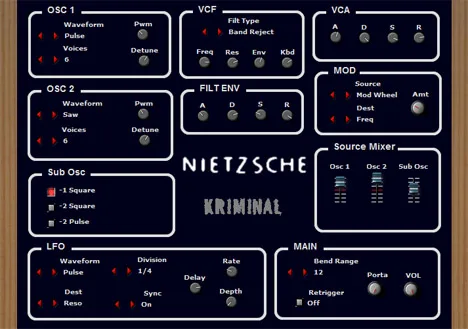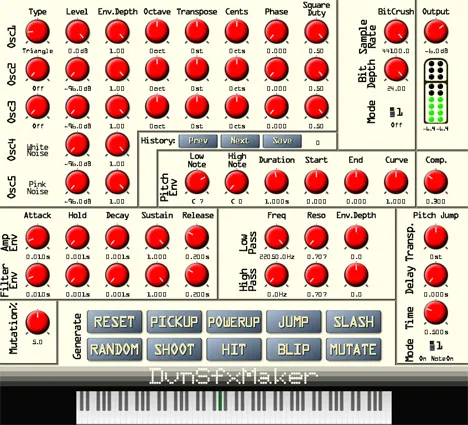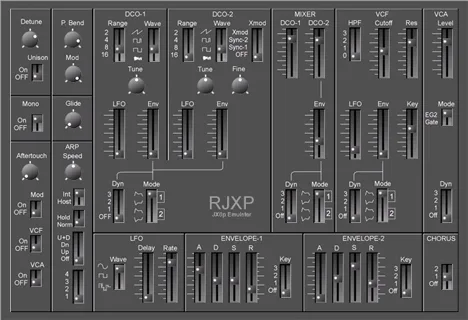In the world of music production, new tools constantly emerge, sometimes simple, sometimes complex, but each of them can become a key element in creating a unique sound. Today we will review the Nietzsche plugin from developer Kriminal – a synthesizer that, despite its “basic” nature, as the author notes, has the potential to create impressive textures and solid foundations for your tracks.
Nietzsche: Simplicity that gives birth to power
At first glance, Nietzsche may seem like a modest instrument. However, as in philosophy, sometimes deep meaning and considerable power are hidden in simplicity. This VST synthesizer is designed with an emphasis on the fundamental elements of sound design, which makes it a great starting point for both beginners and a valuable addition to the arsenal of experienced musicians.
Instead of overloading the user with a multitude of functions, Nietzsche offers a focused set of tools for sculpting sound. This allows you to quickly understand the principles of operation and focus on the creative process itself, without getting lost in endless menus and settings.
Key features and architecture
The heart of Nietzsche is its oscillators. The plugin is equipped with three sound sources:
- Two Unison oscillators
- One Sub oscillator
This configuration is classic and time-tested. Unison oscillators allow you to create a rich, saturated sound by multiplying and slightly detuning several voices of one oscillator. This is ideal for dense leads, voluminous pads, or fat bass lines that should “sit” in the mix.
The Sub oscillator, as the name suggests, generates a signal one or two octaves below the main oscillators. Its main purpose is to add weight and fundamentality to the sound, providing a solid foundation in the low-frequency range. This is especially important for electronic music, where powerful bass is an integral part of the track.
By combining Unison and Sub oscillators, a wide range of sounds can be achieved – from classic analog emulations to modern digital textures. The simplicity of the interface likely contributes to quick experimentation and finding the right timbre.
Who is Nietzsche created for?
This synthesizer will be useful for different categories of users:
- Beginners: Due to its simple structure, Nietzsche is an excellent tool for learning the basics of sound synthesis. Understanding the operation of oscillators, in particular Unison and Sub, is fundamental for further immersion into the world of sound design.
- Electronic musicians: The plugin is perfect for creating basslines, leads, and arpeggios in genres like techno, house, trance, drum and bass, and many others where a dense and punchy sound is needed.
- Experimenters: Even with a basic set of functions, there is always room for experimentation. By combining Nietzsche with other effects (distortion, delay, reverb, chorus), you can get completely unexpected and unique sounds.
- Musicians looking for a quick solution: When you need a simple but effective synthesizer for quickly sketching ideas or creating basic parts, Nietzsche can come in handy due to its ease and intuitiveness.
Developer Kriminal may have set out to create a tool that is accessible and understandable, but at the same time does not limit creative potential. The name “Nietzsche” is associated with the philosophy of the superman, the ability to overcome limitations. Perhaps this synthesizer hints that even from basic elements, one can create something remarkable.
Although detailed information about other possible functions (filters, envelopes, LFOs, effects) is not provided, the presence of only oscillators may mean that the plugin is maximally simplified, relying on external processing to form the final timbre. This also has its advantages – less load on the processor and a focus on the pure, raw sound of the oscillators.
In conclusion, Nietzsche from Kriminal is an example of how even a “basic” instrument can be valuable. It offers a solid foundation for creating sounds thanks to its Unison and Sub oscillators and is a great choice for those who appreciate simplicity, speed of workflow, and the ability to delve deeply into the fundamental principles of synthesis.
Try Nietzsche in your projects and discover how simplicity can transform into powerful and expressive sound!



